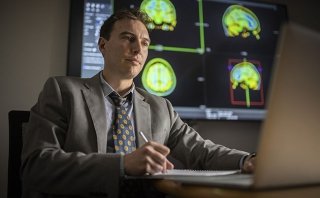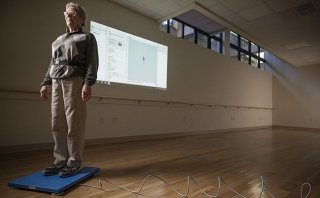
Lewis Lipsitz, MD
- Director, Hinda and Arthur Marcus Institute for Aging Research
- Chief Academic Officer, Irving and Edyth S. Usen and Family Chair in Medical Research, Hebrew SeniorLife
- Professor of Medicine, Harvard Medical School
- Physician, Division of Gerontology, Beth Israel Deaconess Medical Center
- Faculty
Lewis Lipsitz, MD, is the Director of the Hinda and Arthur Marcus Institute for Aging Research and Chief Academic Officer at Hebrew SeniorLife, Professor of Medicine at Harvard Medical School and the former Chief of the Division of Gerontology at Beth Israel Deaconess Medical Center (BIDMC). Since 2021, Dr. Lipsitz has served as the editor-in-chief of The Journal of Gerontology, Series A: Biological Sciences and Medical Sciences. His research is focused on age-related alterations in blood pressure and cerebral blood flow regulation and their relation to falls, syncope, and cognitive dysfunction.
During his 40+ year career, Dr. Lipsitz has served as Principal Investigator of an NIA-funded Program Project Grant for over 26 years, an Older American Independence Center Grant for over 15 years, and a Hartford Foundation Center of Excellence in Geriatric Medicine grant for 15 years. In these roles he has assembled multidisciplinary teams from multiple academic institutions and laboratories to study the mechanisms and management of several important clinical geriatric syndromes, including falls, syncope, dementia, delirium, and frailty. He was Principal Investigator of an NIA Merit Award to study the physiologic mechanisms of frailty in old age, which led to his ground-breaking theory of the “Loss of Complexity with Aging” – a discovery that aging is associated with a loss of complexity in a variety of physiological systems that leads to the impaired ability to adapt to stress. His translational research has shown that Tai Chi exercise, vibrating shoe insoles, and noninvasive brain stimulation can improve the complexity and performance of walking and balance in older adults. He is currently studying the effects of two drugs that can rid the body of senescent (old) cells and their toxic products on cognition, brain blood flow, and mobility in older adults with mild cognitive impairment and slow gait.
Recognizing the critical need to translate basic and clinical research into policies and practices that improve the quality of life and care of older individuals, Dr. Lipsitz became a Health and Aging Policy Fellow in 2011, supported by Atlantic Philanthropies. Since then he has participated in several federal and state projects to improve the care of nursing home residents, including a recent collaboration with the Massachusetts Executive Office of Health and Human Services to improve COVID-19 infection control in the State’s nursing homes.
Dr. Lipsitz also provides geriatric consultations and acute care for older patients at Beth Israel Deaconess Medical Center where he teaches medical residents and geriatric fellows.
Dr. Lipsitz's research has focused on abnormal blood pressure regulation and its relationship to the development of falls and syncope in the elderly. His initial prospective clinical investigations led to the recognition that nearly one third of syncopal episodes in frail elderly patients are related to hypotensive responses to common daily stresses such as posture change, meals, and preload reducing medications. He was the first to identify postprandial hypotension in the elderly, probe its underlying mechanisms, and demonstrate its relationship to syncope. In randomized, double blind, placebo controlled trials he found that 3,4 DL threo dihydroxy phenylserine was an effective treatment, but caffeine was not.
In several elderly populations, Dr. Lipsitz observed a relationship between systolic hypertension and the susceptibility to hypotension. He found that both orthostatic and postprandial hypotension are related to supine BP elevation, independent of medication use. This may be due to the additive adverse effects of age and systolic hypertension on baroreflex function and diastolic ventricular filling. In a randomized, double blind, cross over trial he showed that treatment of BP elevation with a calcium channel blocker, ameliorated postprandial hypotension. More recently he has shown that the treatment of hypertension increases cerebral blood flow in elderly hypertensive patients. His current work examines the relation between hypertension or other cardiovascular risk factors and frontal subcortical symptoms such as executive dysfunction, slow gait, depression, and urinary incontinence, and whether this relationship is due to cerebral hypoperfusion and resultant microvascular disease.
Building upon his observations that physiological measures such as blood pressure and heart rate are highly variable with beat to beat fluctuations that resemble nonlinear dynamical processes, Dr. Lipsitz applied the principles of nonlinear dynamics to his work. He proposed that healthy physiologic function is characterized by the nonlinear interaction of multiple control processes and feedback loops that produce highly complex outputs such as the beat to beat irregularity of the normal sinus cardiac rhythm, or the moment to moment adjustments in center of pressure during quiet standing. Using a variety of mathematical techniques derived from Fourier analysis and chaos theory, he found that heart rate irregularity increases as neonatal swine develop innervation from the right stellate ganglion to the heart, and that the development of complex heart rate dynamics is prevented by right stellate ganglionectomy. In healthy humans he reported degradation in the fractal structure of the sinus rhythm heart rate with advancing age. He also showed that women have greater and more irregular heart rate variability than men, possibly due to an effect of estrogen on beat to beat cardiovascular dynamics. These studies suggest that loss of integrated physiologic control associated with immaturity, male gender, or senescence may impair adaptive responses, and predispose individuals with these characteristics to injury or disease.
Using similar approaches, Dr. Lipsitz has shown specific alterations in heart rate, blood pressure, and respiratory dynamics preceding the onset of vasovagal syncope. Furthermore, he has characterized abnormalities in the dynamics of postural sway in elders at risk of falls. These studies not only provide new insights into potential neural mechanisms of falls and syncope in the elderly, but also new diagnostic tools and therapeutic strategies to help identify and treat individuals at risk. One promising therapeutic intervention to prevent falls in the elderly is based on the physical principal of stochastic resonance, in which noise is used to enhance the detection of a weak signal. He has shown that mechanical noise delivered to the feet using vibratory insoles, can improve postural control and gait in groups of elderly people and patients with strokes, diabetic neuropathy, or falls.
| 1983 – 1988 | Academic Award National Institute on Aging |
| 2006 – 2015 | NIA Merit Award R37 AG25037 |
| 2007 – 2009 | Hartford Foundation Senior Leadership Scholar Association of Directors of Geriatric Academic Programs |
| 2010 | Recipient, William Silen Lifetime Achievement in Mentoring Award Harvard Medical School |
| 2010 | Recipient, Joseph T. Freeman Award Gerontological Society of America |
| 2018 | Recipient, Donald P. Kent Award Gerontological Society of America |





